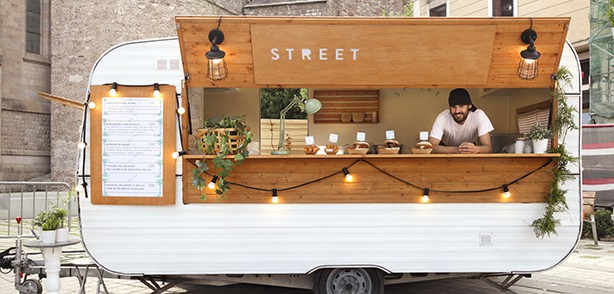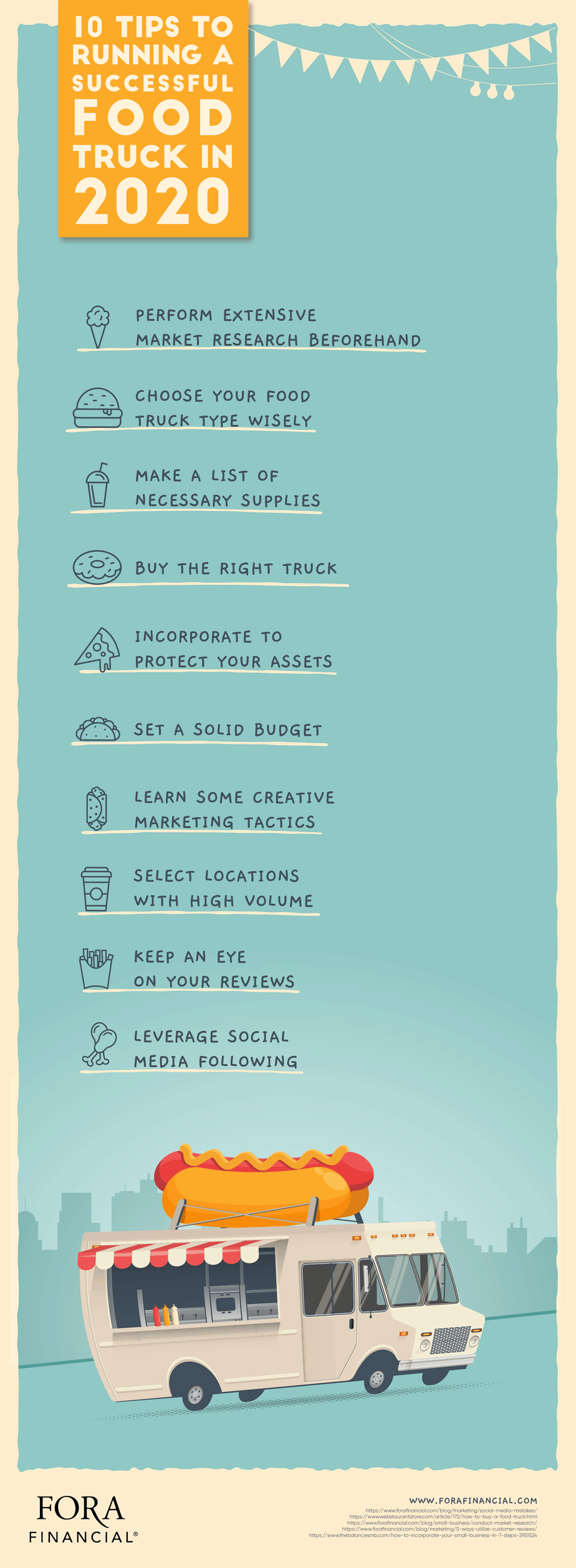10 Tips for Running a Successful Food Truck Business

If you have a passion for food but don’t want to open a restaurant, consider opening a food truck business. It’s less expensive than starting a brick-and-mortar restaurant and a great way to start a career in the food industry.
Food trucks are more popular today than ever before; you’ve likely seen them at festivals, birthday parties, weddings, and other special events. In addition, since the COVID-19 pandemic began, many patrons have opted for grabbing meals from food trucks instead of visiting restaurants. If you’re intrigued by running a food truck or already own one and want to learn how to grow a food truck business, keep reading this post!
The Food Truck Craze Continues
The idea of food trucks began in 1961 when street vendors sold food from carts in New York. Construction workers, delivery personnel, and garment workers bought meat, sandwiches, and fruit. In 1974, King Taco’s first taco truck came to life and led to a successful brick-and-mortar restaurant chain in Southern California. Since then, the industry has evolved to feature brightly colored exteriors, often with unique branding. Many of these business owners focus on specific types of food, such as pizza, tacos, grilled cheese, and cupcakes. For example, The French Quarter is a truck in New Jersey that offers Cajun-style jambalaya, fried shrimp, and other New Orleans fare. Food trucks have been growing exponentially since the recession in 2008. As of 2019, there were more than 23,000 food trucks in the United States, earning about $1 billion each year. When they first started to appear on the food scene in 2008, food trucks were considered "trendy". Today, however, they’re a mainstream concept often preferred over restaurants and fast food.
Inside The Growth of the Food Truck Industry
While the restaurant industry has grown about 2 percent in recent years, food trucks have skyrocketed at an annual growth rate of 7.9 percent. The food truck craze shows no sign of slowing down as people view food trucks as a fun and affordable way to try new foods. More and more people are realizing the growth of this industry and pursuing food truck ventures as a result. Here’s why: they require a much smaller initial investment than a restaurant. Startup costs will depend on your state but are typically as little as $30,000 to $40,000. Although there are food trucks in most cities, they are prevalent in places like Austin, Los Angeles, Portland, and Seattle. They are often successful business ventures patrons can visit in busy streets, business districts, farmer’s markets, bars, sports venues, gas stations, and anywhere they’re legally allowed to be.
10 Tips For Food Truck Success:
Although it’s easier and more affordable to start a food truck instead of a brick-and-mortar location, it does take time and effort to ensure success. Specific strategies can help you stand out from other food trucks, gain new customers, retain loyal ones, and maximize your profits. Let’s dive deeper into some of the best tips for starting and growing a successful business in this industry.
1. Perform Extensive Market Research
Before you buy a food truck, take time to conduct thorough market research. Your research should help you uncover the answers to questions such as:
“Is there an emerging food trend in your town or city?”
“Do certain areas need food trucks?”
“Is there an abundance of a certain type of food truck?”
If you know the answers to these questions, you’ll find it easier to make strategic business decisions.
2. Choose Your Truck Cuisine Wisely
The options are endless when selecting the kind of food truck business you want to open. You can offer cuisine such as:
Pizza
Barbeque
Sliders
Tacos
Grilled cheese
Dessert
To select the perfect food truck cuisine, you’ll need to conduct market research. If you discover numerous grilled cheese food trucks in your area, but there aren’t any pizza trucks, that may inform your decision. Try to choose a food truck that allows for less competition, is also affordable, and suits your interests.

3. Make A List Of Necessary Supplies
You’ll need various supplies to open and operate your mobile food business in the long term. Your list will likely include items such as:
Disposable gloves
Aluminum foil
Containers
Dishes
Utensils
Cleaning supplies
Safety supplies
Once you create a list, you can shop around to find the best deals on supplies and inventory. Most likely, this simple strategy can save you a great deal of time and money.
4. Buy The Right Truck
Not all food trucks are created equal; believe it or not, food trucks range in price from $50,000 to $250,000. In addition, you can buy a new or used truck or even consider leasing a truck. Typically, new trucks are customizable but can be very expensive. On the other hand, used trucks are cheaper than new ones but come with a higher risk of expensive maintenance. Another option is to lease a truck to test your venture and spend less cash each month. When you figure out what type of food truck you want to buy or lease, go to a reputable truck dealer like Prestige Food Trucks, Cruising Kitchens, or FoodTrucks.net. Lastly, you’ll need to consider how to finance your food truck purchase. Many business owners pursue food truck business loans to purchase their vehicles in this situation. Once you receive a food truck loan, you’ll have the funds to buy your truck without taking away cash flow from other business expenses.
5. Incorporate To Protect Your Assets
You could start your food truck business as a sole proprietorship and incorporate it down the road. However, the wise move is to incorporate your business from the start. Since you’ll be selling food products, which can make people sick, incorporating can protect your assets in the event of a lawsuit. First, decide on a name and register your business in your state. Then, obtain an Employer Identification Number (EIN) from the IRS. Ensuring that you have all required licenses and permits will be crucial.
6. Set A Budget and Pursue Financing
A solid budget is a vital part of any food truck business plan. To create financial projections, you should write down the amount of money you want to spend for each business component. These components may include kitchen equipment, hiring truck operators, vehicle maintenance, and marketing. Remember that the food truck market and regulations will likely cause budget changes over time. Also, make sure your budget is realistic and allows you to take on as little debt as possible. As previously mentioned, food truck loans can be a great way to finance your business. So, after your budget is complete, research business financing options such as:
Small Business Loans
Equipment Financing (Equipment Loans or Leases)
Business Line of Credit
Business Credit Cards
SBA Loans
7. Try Creative Marketing Tactics
Marketing is one of the keys to business success, so you should create a marketing strategy that involves multiple approaches. Here are a few top examples:
Try digital marketing strategies such as Facebook ads and Search Engine Optimization (SEO)
Create an email newsletter, informing nearby patrons of where your truck is parked and what your menu includes
Invest in traditional initiatives like direct mail marketing.
Your marketing efforts should be ongoing and will evolve as you learn what works and what doesn’t
8. Park Your Truck at High Volume Locations
As a food truck owner, you have the freedom to take your business just about anywhere. Think about where your ideal customers hang out the most, then get clearance to park your truck there and see if the location attracts significant foot traffic. Food trucks perform optimally at festivals, business districts, and food truck parks. However, since the COVID-19 pandemic, food trucks have also become popular in residential areas, as patrons like getting food and eating it safely in their homes.

9. Monitor Online Reviews
In the present day, reviews can make or break your small business. For this reason, it’s in your best interest to monitor your reviews regularly. If possible, respond to all customer reviews, regardless of if they are good or bad. This way, prospective customers who search for your business online will know that you value your customers and are always looking to improve. To increase reviews, you may want to offer an incentive (such as a discount) so that customers review your food truck and you build trust online.
10. Leverage Social Media
Social media marketing can do wonders for your food truck business. Create compelling Facebook, Twitter, and Instagram pages and update them often. Share information such as:
Your hottest menu items
Where your truck will be parked
Deals
Giveaways
Get people excited about your business so they become followers; this could prompt them to share your content with their network.
Final Thoughts On Food Truck Success
A food truck business can be an exciting way to become an entrepreneur, earn a living, and make a positive difference in your community. However, just like any business, it takes hard work, dedication, and patience. As long as you select the right financing option and follow these tips, your chances of success are very high.

-
Food trucks have increased in popularity in recent years because they allow people to try new foods at affordable prices.
-
If you open this type of business, you’ll have a much lower initial investment than starting a restaurant. Also, you’ll likely profit much faster and be able to experiment with different locations.
-
While the food truck concept started in 1961, it has skyrocketed in popularity over the past decade. It’s grown 7.9 percent as opposed to the 2 percent growth rate of restaurants.
Editor’s Note: This blog post was updated for accuracy and comprehensiveness in February 2022.
Since 2008, Fora Financial has distributed $4 billion to 55,000 businesses. Click here or call (877) 419-3568 for more information on how Fora Financial's working capital solutions can help your business thrive.
